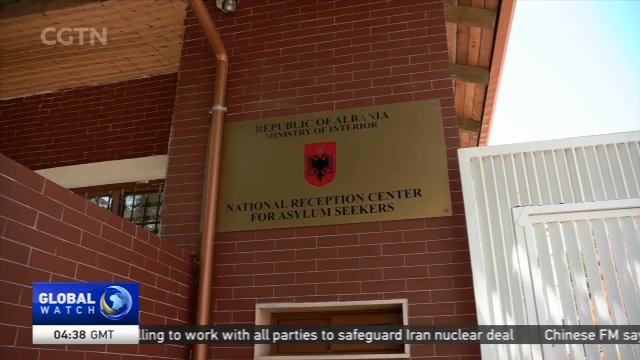
14:01, 04-Aug-2018
EU Migrant Crisis: Albania rejects EU proposal for country to set up asylum centers
Updated
13:24, 07-Aug-2018
03:08

Europe continues to grapple with an influx of migrants. And in the latest bid to ease it, western EU countries have suggested opening their new "migrant reception centers" in the southeast, with Albania cited as one possible location. This has been flatly rejected by the country's prime minister. CGTN's Aljosa Milenkovic is by their borders to see how the situation has escalated in the past 12 months.
Albanian border guards check the surrounding mountains for potential illegal crossings. They are near the town of Shkodra, and on the main route to the Montenegran capital, Podgorica.
The terrain is rough, temperatures regularly climb to near 40 degrees Celsius, while venomous snakes also lurch in the bushes. But none of that is enough to dissuade the thousands who desperately want to reach the EU.
ALJOSA MILENKOVIC ALBANIA-MONTENEGRO BORDER "But only in this section of the border, during just one month, hundreds of migrants were stopped trying to illegally cross into Montenegro. And how many of them actually went through undetected is anybody's guess."
Into Montenegro through Albania has become a preferred route of late, so we were told by some Asian migrants at an asylum center on the outskirts of the Albanian capital, Tirana.
They chose to avoid the much more convenient Bulgaria because, they feel, it's too dangerous.
MOMEN NAVID MIGRANT FROM AFGHANISTAN "It's tougher. It's tougher at the border, it's tougher, they are beating people, taking the phones, so we only have only bad news. We have here camp, and it is on the street, I don't know. The people that went here before us, they give this information, we don't should come.”
As a result, the amount of migrants choosing Albania has increased. A worrying trend for the UN refugee agency in the country.
PABLO ZAPATA UNHCR DIRECTOR FOR ALBANIA "The numbers, as I said, have risen with regards to last year. They are three times bigger than the whole last year, so we are not minimizing that. But this is the sixth month, the fifth month, sorry, where there is the relative stability. So, January, February, March, were exponential growth, and then it was concern what happens if this continue growing in the same proportion. However, after April the numbers have stabilized."
While authorities seem to have controlled the situation to a certain degree, they know it could escalate at any time.
Indeed it's not so long ago since Albania wasn't even considered as a potential migrant route into the EU. So the government is now doing all it can to shore it up.
ROVENA VODA ALBANIAN DEPUTY INTERIOR MINISTER "Our state police have tried to work on two directions, not only on the border control and making patrols, joint patrols etc. But also fighting the individuals and criminal groups that facilitate the route of illegal migrants through the borders of Albania to pass then to the EU countries."
In the first half of this year alone, Albanian police arrested 24 smugglers. And yet many are wondering if their efforts are making any difference.
Aljosa Milenkovic, CGTN, at the Albanian - Montenegro border.

SITEMAP
Copyright © 2018 CGTN. Beijing ICP prepared NO.16065310-3
Copyright © 2018 CGTN. Beijing ICP prepared NO.16065310-3